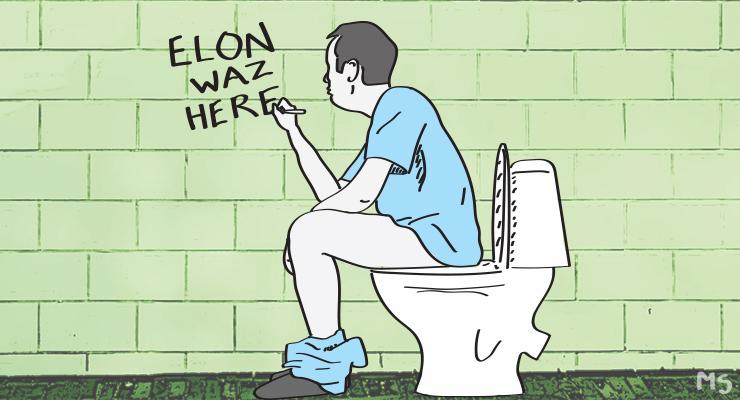
Billionaires are funny creatures. They’re plenty rich enough to insist on a voice in public discourse, but never rich enough to care less what others think of them.
Sooner or later they decide to do something about it. How? By buying a megaphone that will amplify their voice into the political, social, cultural power they believe their wealth entitles them to. Minimising the voice of critics on the way through? Added plus.
It’s part literary trope — that longing for cultural and social validation that money alone can’t bring — and part strategic confidence that a megaphone can elevate them from merely very rich to a global oligarch.
Amid all the “What’s Elon up to?” pondering, it seems there’s not much more — or less — to it. It best explains what he hopes to achieve with his Twitter purchase and its consequent remaking into his own intellectual image. He’s not the first billionaire to give it a go. It’s unlikely he’ll be the last.
Trouble is, as Musk is discovering, it’s a plot line that leads more often to failure than success. Sure, media companies can, or once could, turn their owners into billionaires (hello, Rupert!). But billionaire-bought media companies struggle, particularly when their new owners can’t leave well enough alone.
We’ve got our own experiences in Australia: back in less inflated times, some of our wealthy went in search of a local megaphone, like Lang Hancock’s Sunday Independent (to promote Western Australian secession) or Robert Holmes à Court’s Western Mail. (To be fair, Holmes à Court’s early 1980s recruiting drive transformed Perth journalism — and journalism wages — for the better.)
The detailed message exchanges between Musk and his assorted hangers-on revealed in Twitter v Musk are cultural artefacts revealing the peculiar arrogance of the Silicon Valley elite, how their ”move fast and break things” mantra delivers unique insights that can be applied to any business opportunity, coupled with the right’s moral panic over “woke censorship”.
It’s turning out these are the worst mix of beliefs to bring to the ownership of a global social media platform. Already it seems no bad idea from the message-driven workshop has gone unprototyped (to use Valley-speak) in the Musk-owned Twitter.
In announcing he was going ahead with his bid in October, Musk piously framed these beliefs in publicly acceptable terms: “Free speech is the bedrock of a functioning democracy, and Twitter is the digital town square where matters vital to the future of humanity are debated.”
The platform would be revitalised, he said, by eliminating spam and bots and by opening the space up to all but illegal speech.
In practice, this has meant letting hate-filled voices back on the platform. The result: a largely ad-free channel where the tech-bro geist meshes with white supremacy, misogyny and homophobia to create a conspiracy-laden narrative.
The cost has been the flight of its major advertisers, a failed subscription rollout, and just this week a threatened expulsion from the essential Apple app store. Meanwhile, in a demonstration of employer solidarity, the Silicon Valley elite are cheering on Musk’s assault on its own workforce and disrupting employee control over their own product.
After mournfully noting what we’re losing with Musk’s Twitter (such as global mobilisations like the Black Lives Matter movement), Jelani Cobb noted in The New Yorker this month: “The singular virtue of the fiasco over which Musk has presided is the possibility that the outcome will sever, at least temporarily, the American conflation of wealth with intellect.”
Maybe. I guess we’ll find out here, too, if Australia’s traditional media stop breathlessly reporting the commentary from our home-grown billionaires.
Or maybe not.
“Let me tell you about the very rich,” wrote that chronicler of the 1920s generation, F Scott Fitzgerald. “They are different from you and me. They possess and enjoy early, and it does something to them, makes them soft where we are hard, and cynical where we are trustful … They think, deep in their hearts, that they are better than we are because we had to discover the compensations and refuges of life for ourselves.”
When those very rich get their own megaphones, they get to remind us of that truth over and over again.
Is your Twitter experience better or worse since Elon took the reins? Let us know your thoughts by writing to letters@crikey.com.au. Please include your full name to be considered for publication. We reserve the right to edit for length and clarity.








Sure, he’s a self-made man, but look at what he’s made himself into.
Perfectly summed up in the cartoon. Another beautiful piece of work from Mitchell Squire.
By buying Twitter he ensured he’d never be banned, like Trump. It proved to be expensive insurance against a potentially bruised ego. Regardless, his name is now soiled.
At some point Musk’s takeover of Twitter will make for a terrific movie.
If Twitter crashes and burns it will be no great loss. If the functionality really has any value it can be readily recreated. Facebook /Apple /Google would probably love to fill the vacuum left by the smoking carcass of Twitter.
I’m wondering when Musk will announce his candidacy for US President. Republican Party, of course.
Awkwardly, and unlike Obama, he was born in Africa. Under Article 2 he probably can’t be president. Whether he can achieve more power than a president without the bother of being elected, is a different question.